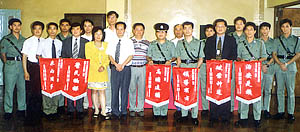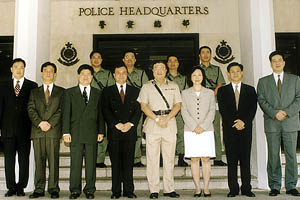|
Got something to say? E-mail
(offbeat@police.gcn.gov.hk), phone, fax or write a letter to Editor OFFBEAT and say it. We're here for you.
NOTE: OFFBEAT will not publish feedback sent
anonymously. However, we will withhold names and addresses on request.


Wong Tai Sin officers honoured with silk banners
Police response to robberies praised
DEAR SIR,
Earlier this year the Mutual-aid
Committee and Colliers Jardine Properties Ltd reported a number of robberies in Fu Keung
Court, Wang Tau Hom and Wong Tai Sin to the Wong Tai Sin Divisional Commander through
the Wong Tai Sin Police Community Relations Office.
Assistant Divisional Commander (Operations) Li Chung-ming then instructed a task
force to handle the matter. At the same time, the crime prevention office advised the
management company of Fu Keung Court on precautionary measures against burglars and
how to prevent crime in general.
After a series of operations, the Wong Tai Sin Task Force Team Four arrested three
suspects on April 1 while they were climbing into a flat in Fu Keung Court. The suspects were
later found to be illegal immigrants and were charged with attempted burglary and immigration
violations.
The Mutual-aid Committee and Colliers Jardine Properties Ltd wish to thank the
police officers involved in the arrests of the robbers, as well as those officers whose advice
and work has led to enhanced security at Fu Keung Court. Together with Provisional District
Board member Lo Chiu-fai, we are honoured to present silk banners to the police officers of
Wong Tai Sin Police Station.
Yours sincerely
Fu Keung Mutual Aid Committee/
Colliers Jardine Properties Limited
|
|
Caps

DEAR SIR,
The Force is canvassing opinion on
the proposed new (and in my view) vastly improved uniform - smart and functional. I
would like to raise the subject of caps - do we really need them?
Why are caps worn? Primarily because of tradition. Most uniforms are reminiscent
of the military and look incomplete without headgear. Hats also help homogenise a unit,
be it on the parade ground or in the field, reducing the look of individuality and thus giving
the impression of a tight-knit band willing to bend to the common goal of the group.
Hats are also worn so that members of the public will find it easier to see a police
officer on a crowded street. It also gives added height, formality and an air of authority.
(That is partly why English police forces persist in wearing the tall blue bobbies - helmet).
And of course, a hat can give some measure of protection - including from the weather,
and in the case of Hong Kong in the summer, from the sun.
Are there any disadvantages in wearing a cap? From a police point of view, yes.
Any cap that has a peak restricts peripheral vision upwards by around 50 per cent. This
represents a significant amount of visual information lost to a patrolling officer who, of
course, needs to observe what is going on all around. Upward peripheral vision is vital in
built up areas and in housing estates to see things happening in windows, on balconies and
roofs.
"Ah, but we need caps to protect ourselves from the tropical sun.
Really?
How many people do you see walking around wearing sunhats in urban Hong
Kong? The issue cap, be it the wool or newer cloth covered cap, may protect the eyes from
the sun - but at what price? Being black, it draws in and retains the sun's heat. Furthermore,
the body loses 25 per cent of its heat through the head. Is it conducive to effective policing
and making split-second decisions to boil the brain by wearing a black woollen cap in Hong
Kong's hot, humid summers? If we need eye protection, issue us with smart sunglasses.
How are the police normally summoned to an incident?
Most Hong Kong flats have telephones; mobile phones are everywhere; the police
have the latest radio equipment and extremely efficient control rooms to dispatch patrols to
the scene. Although there will always be times that a citizen will summon an officer through
seeing his cap in a crowd, the chances are that the majority of people who are alerted by caps
are those who want to avoid the police, which is why caps are removed when patrolling in
street markets looking for IIs or sellers of untaxed cigarettes, etc.
Our Force Common Purpose includes working in partnership with the public. One
aspect of this includes getting to know the people who live and work in our beat areas. If we
want to present a more human aspect of the Force to the public, perhaps not wearing caps
would show a friendlier, individual and more approachable officer and encourage the public
to open up to us more? This of course needs to be balanced against the need to look
authoritative.
But do we need caps to help us look like we mean business?
Force Values encourages effective communication within the Force. I propose a
survey with the single question to be answered by UB beat officers who patrol, sweating into
their caps in the heat, humidity and pollution of the city eight hours a day, six days a week:
If you had the choice, would you prefer not to wear a cap on patrol?
Chris Pedder
SIP HQ EU K/W
First of all, I should like to thank Mr Pedder for
his encouraging remarks about the uniform. It was depicted without a cap because we could not find
a suitable cap in the "clip art library on our computer!
The points made by Mr Pedder are noted. He may, however, be interested to know
that many Forces in sunny climes, and especially those in litigious jurisdictions, having
done away with head gear or changed to baseball caps, have returned to wearing hats for
the protection they afford the wearer.
Support Wing is seeking to improve the present cap in terms of weight and
comfort, but the general appearance will not change. The cap will continue to be an integral
part of what we hope will be a smart and practical uniform for the future.
C W Mitchell
SP Field Support
|

Promoted !

THE following officers who were
recently promoted received their letters indicating their new ranks from Commissioner of
Police Eddie Hui Ki-on on 3 August at Caine House in Police Headquarters: Albert Cheuk
Chun-yin, SSP Sec Branch; Wendy Choi Wong Fung-yee, SSP REC; Vincent Wong
Fook-chuen, SSP SW; Francis Cheung Chun-por, SP HKI; Francis Cheung Yim-fui, SP
SQW; Michael Chiu Kai-ting, SP P Wing; Henry Ho Ming-sun, SP HKI; Rocky Shek
Wai-wah, SP OPS Wing; Gordon To Wai-chung, SP HKI; Bill Yuen Chung-biu, SP SQW;
and Allen Leung Yiu-lun, Senior Systems Manager, ITB. (Officers on leave who could
not make it to the promotion presentation were: SSP Stephen Cheng Se-lim; SP Matthew
P J Hemmings; SP B J Smith; and SP Dominique D C Ziemann). Congratulations all!
|

John Wall
1910-1998
Ex-Inspector John Wall died in a Sydney
hospital on 15 July 1998 aged 88 years.
Mr Wall joined the Hong Kong Police in 1937 after service in the Australian Army.
In 1941 he was Musketry Instructor at the Police Training School. He was interned in Stanley
Prison in 1941 during the Japanese Occupation of Hong Kong, and resumed service thereafter.
He was O/C Lok Ma Chau Police Station during troubled times in 1949.
In the early 1960s he transferred to the Urban Services Department as first
Commandant of the Hawker Control Force, and he retired from Hong Kong Government
service in 1969.
A Catholic graveside service was held on 21 July at the St John of God Section of the
Rookwood Cemetery in Sydney. John's wife, son, daughter and three grandchildren, plus
many friends were present. Wally Scragg, a long-time friend of John's, attended and also
represented former colleagues from the Hong Kong Police Force.
|
FORCE FACTOID
THE number of female applicants for joining
the Hong Kong Police doubled to 77 in June, compared with 37 in May. Meanwhile, it is
expected that 1,500 women police officers (almost 50 per cent of the Force's establishment
of policewomen) will be armed by the year 2000.
|
|





















![]()
